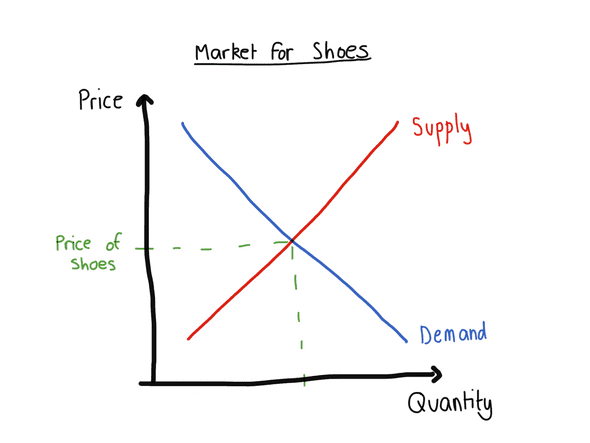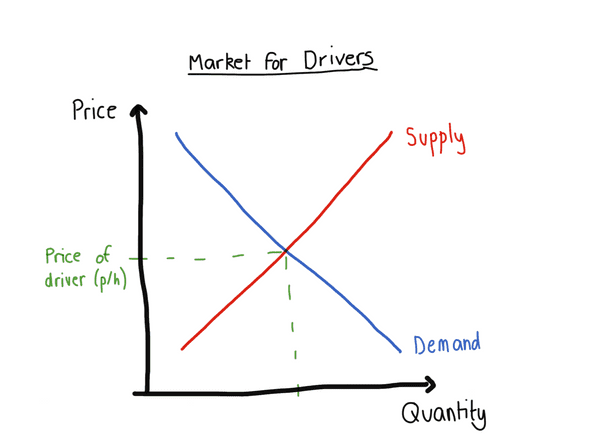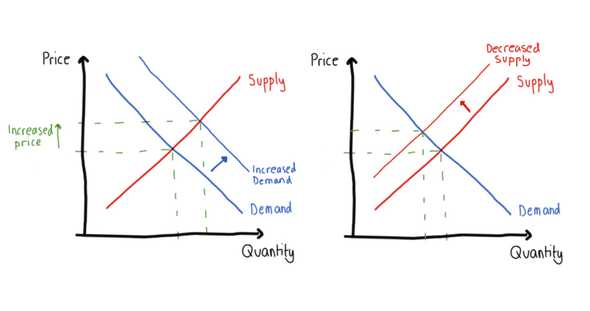The predominant force driving your salary is the law of demand and supply.
Borrowed from economics, the law of demand and supply governs prices. Let’s consider the market for shoes. Demand has an inverse relationship; the cheaper a shoe, the more people that are willing and able to buy it. Supply has a direct relationship; as the price increases, more suppliers are incentivised to produce shoes.
At some price, the demand for shoes and the supply of shoes are equal. This is the equilibrium.
The Labour Market
The same law that governs the market for shoes also governs the market for people’s skills and time. Consider the market for drivers. People want lifts around town. But if those lifts are particularly expensive, they’ll opt for other ways of getting around. On the other hand, when people are willing to pay more for lifts, drivers have greater incentive to give them.
Shifting Equilibrium
So if the equilibrium is the price for a given market, how does the price move?
The price will change as demand and supply changes. Price increases when:
- supply contracts (e.g. there are fewer drivers), or
- demand increases (e.g. there are more people who need a ride)
This has interesting implications for individuals. Demand and supply show us that to be in a job with a good salary (a high price) we need a labour market where demand is high and supply is low1.
High Potential Careers
A popular book on careers is Cal Newport’s So Good They Can’t Ignore you. He recommends that individuals should build rare and valuable skills.
Newport’s recommendation is a statement of demand and supply. Valuable skills are in high demand and rare skills are in low supply.
With Newport’s framing of rare and valuable skills, let’s consider a few careers.
- Driver - Valuable when you need a lift, but not rare. Many people can drive and many people have a car.
- Doctor - Very valuable and fairly rare. Few people have gone through the many years of education required to be a doctor.
- Professional Footballer - Valuable (to professional teams) and very rare.
- Plumber - Valuable and quite rare.
- Cook - Valuable when you’re hungry, not very rare.
In considering a few specific examples, you’ll notice a few things.
First, the best-paid jobs are both rare and valuable e.g. professional footballer.
Second, notice that rare and valuable exist on a relative spectrum. You might not consider doctors rare in an absolute sense. Yet doctors are rarer than cooks, but not as rare as Premier League footballers.
Similarly, you may not think of footballers as valuable. But there are millions of football fans and very few world-class footballers who they’ll pay to watch. Hence, those top 1% of footballers are very valuable to clubs that rely on them2.
Third, combinations of skills can increase value. Consider a chef. Many people are trained as a chef, but far fewer can combine this with business knowledge, which might help them launch their own restaurant. Many careers rely on combining multiple skills to create greater value.
“Career capital tells us that great work doesn't just require great courage, but also skills of great (and real) value.”
Implications for Individuals
Given the role of supply and demand on salaries, what strategies might you use to find highly valued careers?
Seek high demand markets
A good recent example of this is learning web development. As companies moved online, the demand for web developers as a whole increased. So did their salaries.
Improve your individual skillset
As well as choosing an in-demand market, you also want to increase your individual usefulness. Increasing your skills relative to others in your market will increase your individual demand.
Move into (valuable) niche fields
My favourite example of this is the COBOL Cowboys, a group of grey-bearded programmers. COBOL is a computer language from the 60s. It’s not popular now, but many legacy finance systems are built using COBOL. Given banks need COBOL programmers and very few programmers can write COBOL, the COBOL cowboys make good money to do so.
Rather than a niche field, you could also seek niche geographies. There are many native-speaking English teachers in England, but there are fewer native-speaking English teachers in China.
Seek skills & qualifications which are hard to emulate
As well as looking for careers with low supply (e.g. COBOL programming) you can also seek a field where it is difficult to quickly increase supply. A plastic surgeon is a good example of this. Whilst plastic surgery is on the rise, it takes a long time (more than 7 years) to become a surgeon. This means that current surgeons are increasingly valuable and their value is well protected.
Markets Change, The Formula Doesn’t
Job markets are nuanced, so the above are not copy and paste strategies. The COBOL cowboys may be earning lots of money now, but if banks are able to shift away from COBOL, they’ll be out of work.
Job markets change, but the law of supply and demand that governs them do not. High salaries exist where demand is high and supply is low3.
For someone already in a career, be aware of the dynamics that effect your job market and how you position yourself within it.
For those starting out, demand and supply may provide a sign of careers that will prove particularly abundant.
-
Demand and supply also helps to explain why "follow you passion" is sometimes terrible career advice. Specifically, it is bad advice if your passion is a no-demand market. If you are the number one footballer, turns out you are in demand. If you are the number one Eton Fives player, turns out very few people really care.
↩ -
The relationship between the level of your skill and your value to employers is worth investigating more. You might think of it as leverage. A better footballer will have a greater impact on a football game. A better programmer can more effectively convert his time into product. A better investor can more effectively turn his decisions into returns. In short, an employee is highly leveraged if they are highly effective at turning their input (time, skills, decisions) into their employers output (product, money, wealth).
↩ -
In this essay, I have explained the relationship between supply and demand primarily on salary. Of course, there are many more factors that go into a career decision, not salary alone.
↩


